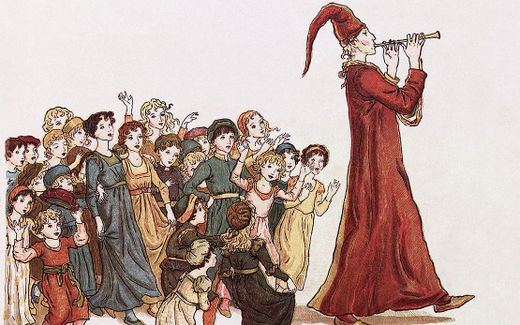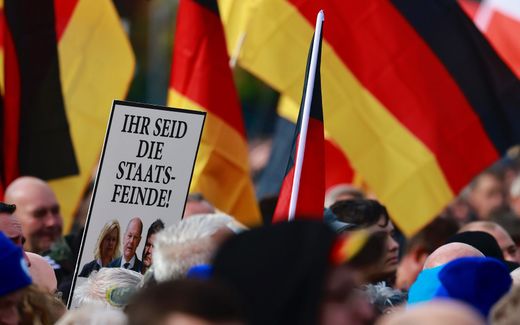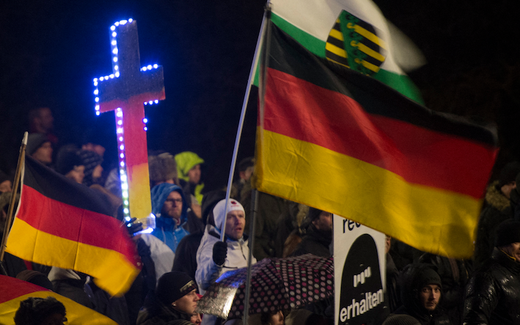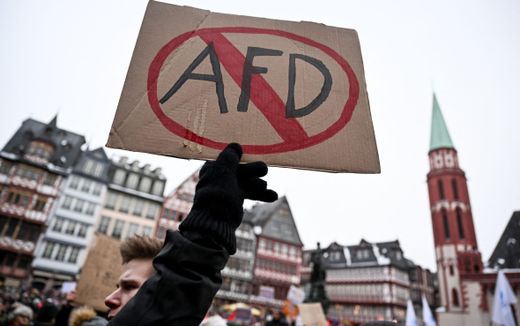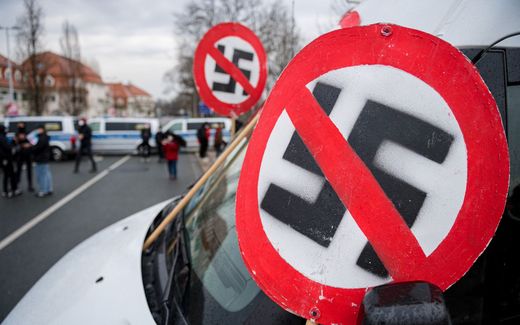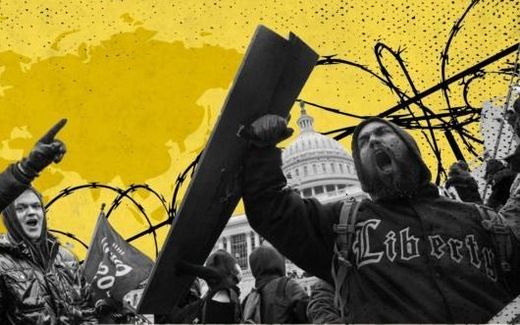German church struggles with radical right-wing AfD party
21-05-2024
Central Europe
Arieke Smits-Lucas, RD
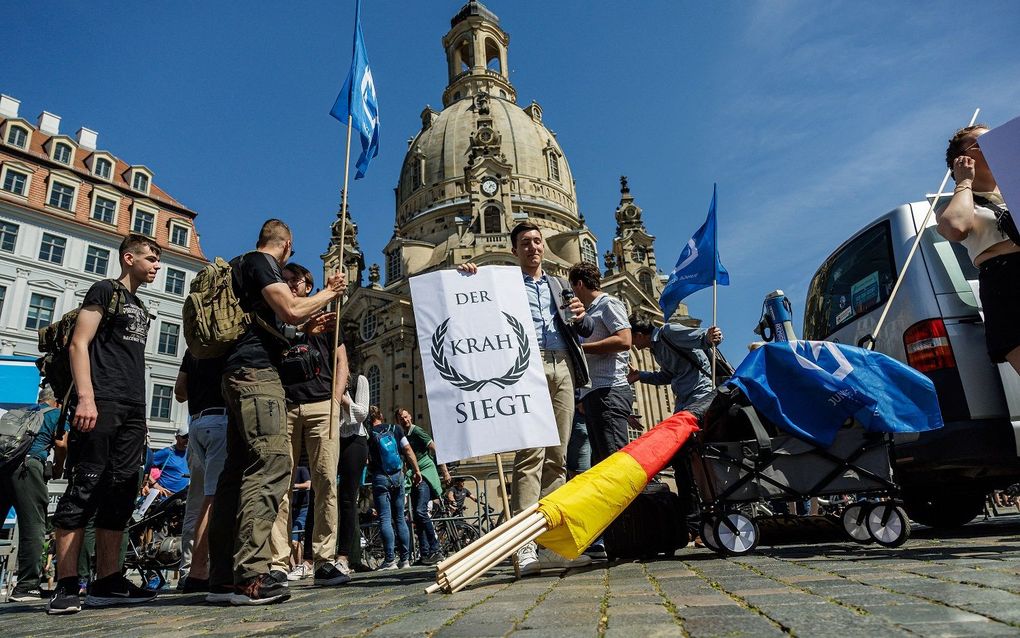
Supporters of the German far-right Alternative for Germany (AfD) party hold a posters reading "Krah wins" during a campaign event for the upcoming European elections in front of the Frauenkirche (Church of our Lady) in Dresden, eastern Germany. Maximilian Krahis the AfD's top candidate for June's EU elections. Photo AFP, Jens Schlueter
Central Europe
German churches are struggling with the ideas of the radical-right Alternative für Deutschland party. According to the Evangelische Kirche Deutschland(EKD), which is the Protestant folk church in Germany, and the Katholische Kirche (Roman Catholic Church), its views are incompatible with the Christian faith. Pastors who openly support the party face disciplinary action.
Early this year, the EKD, Germany's largest Protestant church, and the Katholische Kirche spoke out strongly against the AfD. "The party's ethnic nationalism is incompatible with the Christian image of God and man," said a statement by the German bishops' conference held in February this year.
This is remarkable because the AfD was founded in 2013 in the parish hall of the Evangelische Christuskirche in Oberusel. Moreover, there are issues on which the party and the churches agree. These include abortion and homosexuality, although the Roman Catholic Church is stricter in its views than the EKD.
Yet the relationship between churches and the party has remained largely distant. According to Stephan Ackermann, Bishop of Trier, this is because the AfD has a different starting point. "Churches are primarily and always concerned with human dignity at all stages of life. This also applies to people who are especially vulnerable, such as refugees. The AfD thinks differently about that," he told Deutschlandfunk a few weeks ago.
Ideology
"Anyone who openly adheres to the party's ideology should, therefore, not hold a prominent position in the church, both denominations believe. In practice, this is difficult, Kirsten Fehrs, president of the EKD Council, told German broadcaster Deutsche Welle. "Both churches have no established a legal framework or procedure on how to deal with the persons concerned."
Yet the complexity of the issue does not stop churches from taking action. A few weeks ago, for instance, the EKD started disciplinary proceedings against Martin Michaelis. The 63-year-old pastor is a candidate on an electoral list of the radical right-wing AfD party in his home town of Quedlinburg. However, that goes against the principles of the church, according to the church body.
Even within Diakonie, the welfare organisation of the EKD with almost 630,000 employees, there are "people who make far-right statements", chairman Rüdiger Schuch confirmed to Deutsche Welle. How many people are involved, he could not say.
What should happen to such employees? "They should actually sense for themselves that the institution where they work does not fit their way of thinking. On the other hand, it is important that we can confront employees with the content of their words," Schuch believes. This week, he went a step further, saying that there should be no place for AfD voters within Diakonie.
Rural
Polls show that the AfD can count on around 30 per cent of votes in the eastern part of the country. How many of these voters have a Christian background is not known. In any case, the churches in eastern Germany are not large. In 2022, for instance, less than 15 per cent of East Germans were Protestant and less than 5 per cent Roman Catholic.
Nevertheless, Protestant theology professor Michael Haspel writes on the website feinschwarz.net that the AfD is doing well among churchgoers in rural central Germany. Of that group, 30 to 50 per cent would vote for the party or at least sympathise with its views.
That is why, according to Schuch, politicians and democratic parties in Germany "need to try harder to make it clear to people that they have solutions to the big challenges of the time. That is the way to regain people's trust."
Moreover, Detlef Pollack, a sociologist of religion at the University of Münster, thinks it is important that "churches try to understand why people take extremist positions," he told broadcaster MDR in March. "Churches may position themselves, but they should be careful not to close the door to their members. Always remain open to dialogue, even with those who do choose the party this year."
“Excluding people from the church is undemocratic”
Not everyone is happy with the way the German churches deal with AfD voters. Fatina Keilani writes in a comment in the Neue Zürcher Zeitung that “in a sense, a churchman excommunicates those whose political views he does not share.”
That is a dangerous development, Keilani believes. “It is always said that God hates sin, not the sinner. Now all you have to do is practice what you preach. However, the church doesn't do that”, she writes. Instead, the church does exactly the same thing as it accuses the AfD of: it excludes people.
Therefore, Keilani sees the the move of Diakonia as unchristian and dangerous for the church. She points out that it only weakens the position of the church as more and more people will leave. In addition, she is afraid of undemocratic tendencies in the EKD as the President of Diakonie, Rüdiger Schuch, encourages employers to ask their employees to vote for certain parties.
And not only that, by excluding AfD voters from the church, he even threatens to fire his own employees who vote for the “wrong party”, Keilani points out. And that is illegal.
The same happens in the Roman Catholic Church, she says. There, bishops declared in February that believers cannot vote for the AfD. “With such statements, the church contradicts its own teaching.”
This article was translated by CNE.news and published by the Dutch daily Reformatorisch Dagblad on May 3, 2024
Related Articles

